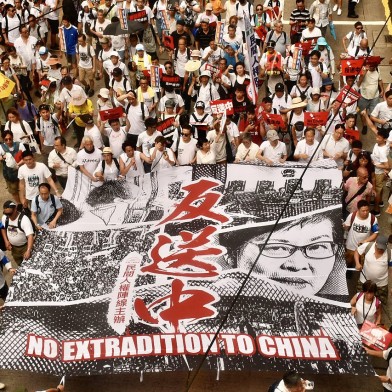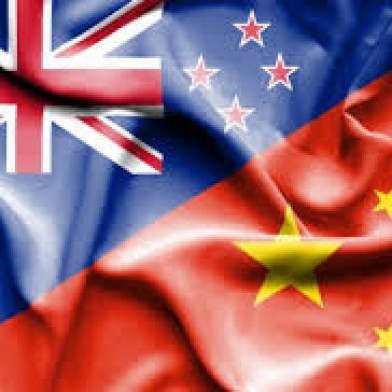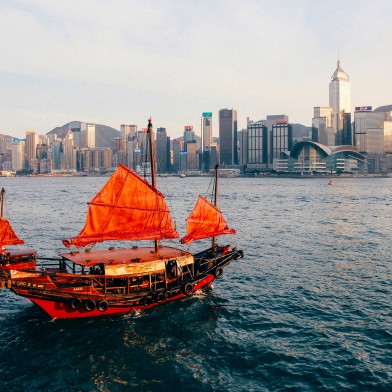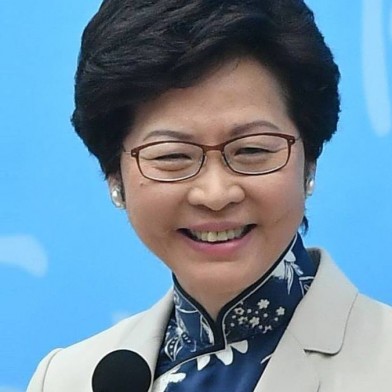Asia Media Centre digital content editor Siobhan Downes reported on the Umbrella Movement in 2014. This week's events have sparked a strong sense of déjà vu, she writes.
ANALYSIS: Almost five years ago, I landed in Hong Kong at the peak of the pro-democracy protests that would come to be known as the Umbrella Movement. I was exactly one year out of journalism school, and spending six weeks at the International New York Times on an internship arranged by the Asia New Zealand Foundation. As a wide-eyed reporter, I was both excited and terrified to find myself covering one of the biggest stories in the world.
The scale of the demonstrations was mind-boggling. There were three major protest sites, each with their own unique atmosphere, in the bustling districts of Causeway Bay, Mong Kok and Admiralty. These areas were occupied by protesters for 79 days, effectively bringing the financial hub to a standstill. At the main protest site in Admiralty, home to the government headquarters, thousands camped out in tents along the highway, against the surreal backdrop of Hong Kong's famous skyscrapers. There was a banner draped across an overbridge bearing the words of the Les Miserables anthem: "Do you hear the people sing?"
The Umbrella Movement of 2014 brought Hong Kong to a standstill.
The Umbrella Movement — which started out as "Occupy Central" but came to be defined by the umbrellas protesters used to protect themselves against police tear gas — was characterised by its youth. Student activist Joshua Wong emerged as one of the key leaders of the movement at the ripe old age of 18. Walking around the Admiralty protest site, I remember being impressed by a makeshift "study corner" with desks set up against the highway dividers, so protesting students wouldn't get behind on their schoolwork.
When I interviewed people on the streets and handed out my business card, they were delighted that someone all the way from New Zealand was interested in their plight. But despite capturing the world's attention for over two months, the Umbrella Movement eventually fizzled out, without any of the demands being realised. Many Hong Kongers, suffering from protest fatigue, were keen for things to return to normal. But during its final days, signs went up with the promise: "We'll be back".

Student protesters making use of a makeshift "study corner".
Last week, they made good on that promise. In scenes eerily reminiscent of those in 2014, hundreds of thousands of mostly young Hong Kongers seized control of Admiralty again, in a bid to block a controversial bill that would allow extradition to China.
There is one important distinction, though. The Umbrella Movement was ultimately about fighting for a right which Hong Kong has never actually had — universal suffrage. The current protests are about rights that could be taken away. Critics of the bill fear it will give Beijing the powers to crack down on political opponents, threatening the open society and freedom that Hong Kongers enjoy under the "one country, two systems" arrangement.
Monitoring media coverage of the protests from Wellington, where I'm now working for the Asia New Zealand Foundation's Asia Media Centre, it was clear that last week's protests were even bigger than those of 2014. Opposition to the bill has been widespread. Even those who have previously hesitated to get involved in these kinds of political discussions — such as Hong Kong's business and financial community — have voiced their concerns. Last week's protests were also more violent. According to the South China Morning Post, police deployed rubber bullets and beanbag rounds, and fired more than 150 rounds of tear gas in one day — almost double the amount used during the 2014 protests.

A banner seen during the anti-extradition protests.
In an extraordinary turnaround, Hong Kong's embattled leader, chief executive Carrie Lam, announced over the weekend that she would indefinitely suspend the bill. But for hundreds of thousands of Hong Kongers, that still wasn't good enough. On Sunday, unprecedented numbers of protesters (almost two million according to organisers; 338,000 according to police) returned to the streets, calling for the bill to be withdrawn permanently.
In yet another surprise move, the government responded to Sunday's events by issuing an apology, accepting responsibility for the row. But it may be too little, too late. More protests are expected as organisers draw up a revised list of demands, which include the removal of the bill, and the resignation of Lam. It is clear the discontent is far from over.
Why? Because all of this is about so much more than just an extradition law. It's about Hong Kong's future. It remains to be seen how long people are prepared to fight for it.
- Asia Media Centre



